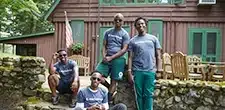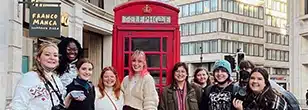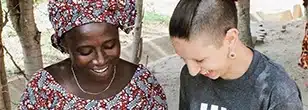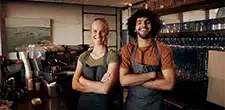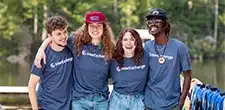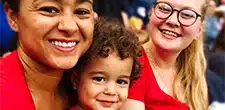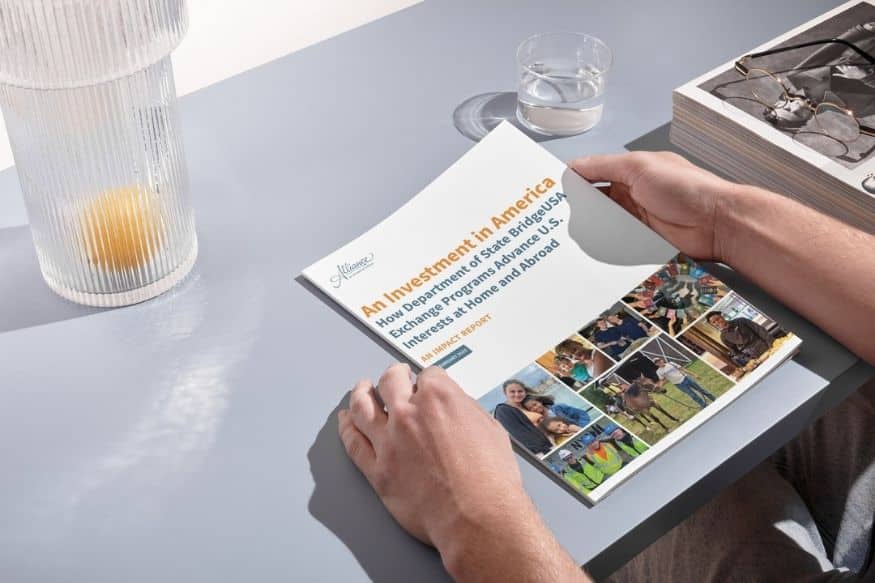Hi, everyone! My name is Alicia and I am currently working in Kara, Togo, as an intern at Association Espoir pour Demain-Lidaw (AED-Lidaw) through their partner, Hope Through Health (HTH). Association Espoir pour Demain-Lidaw is an association of HIV-positive people living in northern Togo that was started in 2001 when a group of family and friends noticed a need for and lack of HIV services in the region. In 2004, Peace Corps volunteers joined together with AED to create Hope Through Health, an American partner organization that helps with strategic planning and financing for AED’s main clinic in Kara and four smaller satellites in smaller towns around the region.
In college I was involved with a club called GlobeMed at MIT. GlobeMed is an organization with chapters at 50 universities around the U.S. with a model of partnership; each U.S. chapter forms a long-term partnership with a grassroots health organization abroad. Through GlobeMed at MIT’s partnership with Hope Through Health, I went on my first trip to Togo last August, and completely fell in love with the country and the culture in Togo, as well as the organization and all of the staff members I befriended. Now I’m back in Togo and working for AED/HTH full time as an intern through an InterExchange Christianson Fellowship. I will work in Togo with AED on this project during June to September 2014. After spending some time in the U.S. to do research and make contacts, I will take a brief hiatus from this project to pursue a Fulbright scholarship to work with the same organization (we will be conducting research in preparation for the clinic’s anticipated expansion into maternal and child health services along with HIV). Afterwards, I will resume work on this data infrastructure project through InterExchange, spending a couple more months hopefully bringing and building open source medical records software to the clinic.
My Partner Organization
Togo is an often and easily forgotten country. It is one of the smallest countries in Africa, easily overshadowed by Ghana, its neighbor to the west. A francophone country that has been devoid of much major political strife, ethnic conflict, health or natural disasters over the past half century, Togo has fallen under the radar of many U.S. aid organizations and efforts. It is therefore a relatively untapped location for research and innovation, positioning AED (Association Espoir pour Demain) as a major player in Togo’s overall health infrastructure and making it the perfect place for me to live and work over the next couple years.
Association Espoir Pour Demain (which translates to “Hope for Tomorrow”) is the leading HIV/AIDS care provider in northern Togo, serving more than 2,000 of the country’s poorest patients with around 50 employees, and is the only community-based treatment program in the region. What that means is that, in addition to running a physical clinic building where patients can come for check-ups with physicians’ assistants and to get medicine at the pharmacy, AED also employs 15 Community Health Workers (CHWs) who visit patients at their houses about once a month to check in with those who are struggling with side effects and to reinforce health lessons learned at the clinic. This relatively new model in health care delivery is part of what makes AED incredibly successful on a small budget – our patients have an 85% adherence rate to their life-saving anti-retroviral (ARV) treatment, compared to a 70% average in the U.S.
My Projects
My work at AED focuses on providing the clinic with the analytical tools – both software and in terms of capacity building – to make informed decisions about how to manage their health programs with the goal of treating patients more efficiently and effectively. Currently, AED tracks its patients through a combination of Excel spreadsheets, paper forms and large notebooks that function as essentially guest books for every office. The lack of consistency across departments, coupled with the fact that most records are not electronic, makes it nearly impossible to look up information about a specific patient or to calculate and analyze aggregate information. Furthermore, while AED’s Monitoring and Evaluation (M&E) department focuses a great deal of energy on monitoring the different departments and requesting monthly reports from each, it has yet to use data analysis to really improve the quality of care. This can be mainly attributed to the fact that no one working at the clinic has any significant background or training in statistics, and that they are bogged down by all of the data they have to compile and reports they have to prepare and don’t have time to really explore and play around with the data they do collect. The monthly reports typically only explore amounts and percentages: e.g. “How many patients came to the pharmacy?” AED’s staff and management has, however, expressed the desire to be able to ask more complex questions such as, “Are patients who receive home visits more or less likely to miss an appointment?” I will work with staff members to implement software that allows for consistent data collection and that lends itself well to analysis, which will in turn allow the staff to make data-driven decisions for improving patient care, especially as the patient base grows. I explain the specific different tools I am working on below.
Connectivity Infrastructure – AED has been really struggling to maintain a working Internet and Intranet connection at our clinic. Problems range from power outages and power surges, to a lack of availability of certain pieces of hardware in Togo, to not having many options of who to use as our Internet Service Provider and therefore being stuck with a really inconsistent and weak signal. This affects all parts of our work, so I’ve been investigating the problem and hope to find a long-term solution that is robust to the challenges of living and working in Togo. It is also why I haven’t been able to post a blog post until now. … Look out for another blog post soon explaining the challenges and solutions I come across!
CommCare is a mobile health platform developed by Dimagi, which allows Community Health Workers (CHWs) to record information from their home visits with patients directly onto mobile phones, so that the data can be compiled into one database and easily accessed and analyzed by the director of our CHW program. Together with a group of MIT students who came to Togo for the summer, I worked to build forms for AED’s CHW program using this app and we are currently rolling out the new technology at the clinic for provisional use during the month of September to evaluate whether it is successful, sustainable and helpful.
Network Database – Last January I worked with another student from MIT to build a web app database to keep track of some of the clinic’s patient data in a central server that clinical staff connects to through Intranet, the local network in the clinic (instead of Internet, which is more volatile in Togo). This has always been understood to be a temporary solution as we work toward implementing more professional, robust software, but I will spend time this month exploring how it has been used since January and making little tweaks to the forms as necessary.
Open Source Medical Records Software – The coolest thing going on right now in the tech world (in my opinion) is the emergence and popularization of open source health software. Bigger and better clinics and hospitals are popping up all around the developing world now that there is increased global attention on health care delivery and equity. With this evolution comes evolving technological needs, especially medical records systems that are robust to the realities of rural and resource-poor medicine (e.g. can work on any type of device, has different language options, can work even if patients don’t know their exact birth dates, etc). Open source coding communities have been working on creating software that meets all of these needs, and is available for free online and continually being updated and improved by the online community (such as OpenMRS – check it out!). However, the catch is that this kind of software is never tailored exactly to the needs of the health centers that use it – they’re unfinished and need the individual users to write some additional code for them to be useable. This is a large task, one that is bigger than I could take on myself, but I hope to do all the legwork on the ground, and find a company to donate the time of a couple of their developers, to adopt and implement some software like this for AED in the next few years.
Throughout my time here, my main focus throughout all of the above projects is to build a culture of analysis in the clinic, so that data collection and management goes from being work that has to get done because someone said so to being a natural element of the daily workflow, where all understand and are invested in the importance of reliable data and has the tools at their disposal to analyze the data they collect to improve their programs, and in turn improve patient care.
by Alicia




